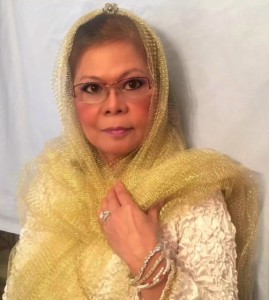Filipino Muslims in US cheered by anti-ban protests

Pakbol, seen here with President Rodrigo Duterte, thinks that the huge protests in the United States against the travel ban on seven Muslim-dominated countries enabled Muslims all over to see that Americans support Muslims rights. CONTRIBUTED
OAKLAND, California — Filipino Muslims in the United States are less bothered by the executive order of President Donald Trump banning entry to citizens of seven Muslim-dominated countries than they are apprehensive of heightening Islamophobia and racism.
Pakbol, a San Jose, California resident who has lived in the United States for 20 years and a legal permanent resident for 14 years, wasn’t surprised at all by Trump’s executive order, as it was the latter’s campaign promise to ban Muslims.
“For green card holders like me, we are not really concerned with this ban; the problem is Islamophobia and racism have just gotten deeper. Just like what happened in a mosque in Quebec where six persons were killed by an alleged Trump admirer, and then there was a big Texas mosque that was burned down,” Pakbol said.
Blunt about Trump
Jane Piang-Shever, a Filipina Muslm from Datu Piang, Maguindanao and now a resident of Battle Creek, Iowa, also anticipated Trump would issue the travel ban; but she more blunt in her views against the new president.
”What do I think of Trump? He will destroy the country. The man does not know what he is doing and is running this country the way his mind works,” Piang-Shever believes.
“As for his ban on Muslims in particular, it is expected, he is a racist after all. What can I do about it? What can any of us really do? I have signed petitions and now I wait and pray for our nation more intensely,” she added.
As a result of the ban, San Jose policemen are now more visible for Friday Muslim congregations, to provide additional security in mosques and prevent any untoward incidents.
Also, the Muslim community is being informed more extensively now on what to do during instances of Islamophobia and that if they have relatives given a hard time in entering ports of entry, that free legal services are to them.
Not too many Filipino Muslims
Pakbol also revealed that not that many Filipino Muslims are here or visiting because of the tense atmosphere. After all, Trump mentioned the Philippines as one of the countries where there are terrorist groups like the Abu Sayyaf.
“I think the U.S. embassy in Manila is already doing some extreme vetting on the Muslims that is why there are only a few Filipino Muslims coming to the United States. Just in the screening process, Muslims are given a hard time. And this has been going for a long time now and not just recently,” Pakbol disclosed.
Besides, Filipino Muslims friends and relatives of Pakbol prefer to go to neighboring Southeast Asian countries like Malaysia, Indonesia and countries in the Middle East where there are virtually no visa requirements and where fares are cheaper.
“They’d rather go also to Korea, China, Thailand, among others. So even if the Philippines is added to the list of banned countries, I do not think it is going to affect Filipino Muslims that much as compared to Filipino Christians wanting to come here,” added Pakbol.
Filipino Muslim advantage
Pakbol mentioned that Filipino Muslims have one advantage over other Muslims in that Filipino Muslims do not look like Arabs and can pass as Mexicans, Vietnamese or Chinese as long as his name is not Mohamed or Abdullah.
Paoshad of New York City thinks that the ban can also affect some of the exchange students that have increased in number in recent years.
“Besides, we have also seen Mindanao professionals coming to the United States to enhance their knowledge in their fields and most, if not all, at the invitation of United States institutions,” Paoshad said. “Our tourists are also coming here to stimulate the U.S. economy mainly through shopping at U.S. outlets and buying all those brand items.”
Nevertheless, like the rest of the Muslim communities in the U.S., Filipino Muslims are just more vigilant against heightened Islamophobia and racism.
More careful
They are on the watch and are more careful if there are strangers and new faces that enter the mosques.
Pakbol says the most recent decision by the San Francisco-based U.S. 9th Circuit Court of Appeals to stop Trump’s ban was good, but was sure the government would bring it all the way to the Supreme Court.

Jane Piang-Shever from Datu Piang, Maguidanao and now also a resident of Battle Creek, Iowa, thinks President Donald Trump will destroy the United States; she thinks Trump is a racist who does not know what he is doing. CONTRIBUTED
“In the meantime, we also pray that no terrorist act occur in the U.S. while the Muslim ban is being debated,” Pakbol wished.
Despite all the gloomy developments that affect many Muslims all over, Pakbol cannot help but see the goodness that recent events have generated.
“Muslims everywhere saw the two faces of America. And with the protests, Muslims realized that Americans are not really bad and anti-Muslims, after watching the nationwide protests in defense of the Muslims. That’s a positive development, a hope amidst the troubles caused by the ban. As a result of this so-called Trump ban there is an ongoing reflection on the very core of being an American. One side wants just the whites dominating while the other insists that this is a country of immigrants where it is all-inclusive regardless of race and religion,” Pakbol enthusiastically noted.
Things will get better
Maorak of Houston, Texas, agreed with Pakbol that the ban will initially cause some confusion and misunderstanding between Muslims and non-Muslims in America but in time things will get better.
“Like an illness it gets better or cured. Or every disappointment carries a hidden positive message and the challenge is to find that message. In this case, the good message is that people have to confront the problems like ignorance,” said Maorak.
Pakbol reported that there is still no national organization of Filipino Muslims in the United States although for some time now they have been discussing having one.
“What we are organizing though is not so much as a religious group but more of a social and cultural group. We are inspired to do our part in enhancing awareness of the Muslim culture more than Filipino cultural shows that make use of malong (a native dress) and kulintang (a musical instrument).

